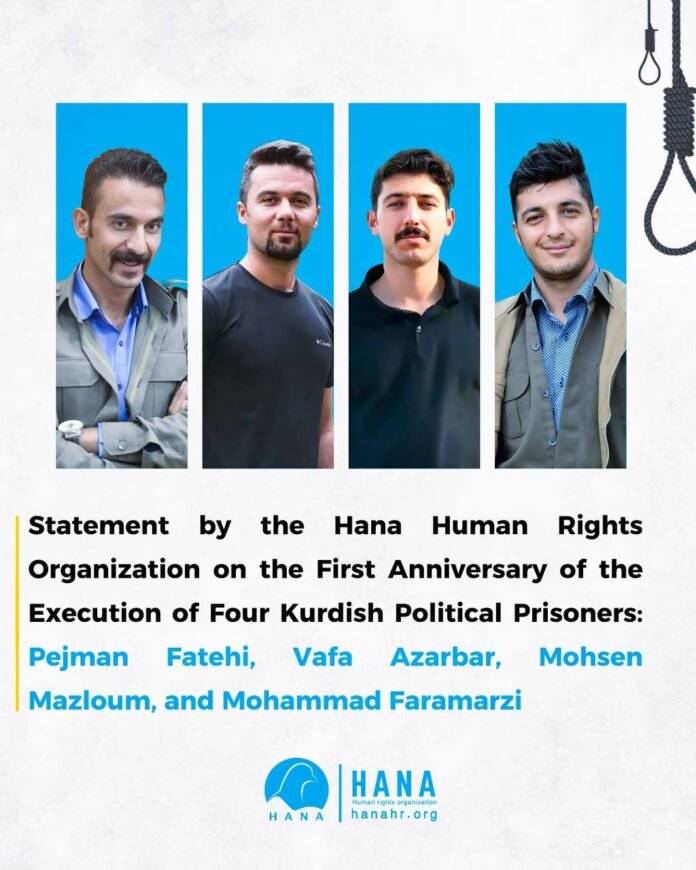One year ago, on January 28, 2024, four Kurdish political prisoners—Pejman Fatehi, Mohsen Mazloum, Vafa Azarbar, and Mohammad Faramarzi—were executed by the judicial system of the Islamic Republic of Iran on charges of “espionage for Israel.”
Hana Human Rights Organization confirms that the investigation and trial processes for these four Kurdish political prisoners not only failed to adhere to the principles of fair trial under international human rights law but also violated the basic criminal procedure standards under the Islamic Republic of Iran’s own laws. From the moment of their arrest—or more accurately, their “enforced disappearance”—by Iranian security forces, Vafa Azarbar, Mohsen Mazloum, Pejman Fatehi, and Mohammad Faramarzi were held in secret-security detention centers of the Ministry of Intelligence. They were denied access to the basic rights of an accused person, including the right to legal counsel and legal consultation.
Interrogation sessions, followed by trials in the Tehran Revolutionary Court, were conducted in complete secrecy without the presence of chosen attorneys and only in the presence of security officials and interrogators. Their death sentences were determined by security authorities, with the judiciary merely endorsing and implementing the verdicts.
It is worth noting that since the government announced the execution of these four individuals, the Islamic Republic of Iran has refused to return their bodies and has provided no information about their possible burial sites.
The enforced disappearance of their bodies constitutes a continuous international crime under international law. The global sensitivity to this crime has led to the establishment of a significant international convention (which came into effect in 2010) dedicated to the protection of individuals against such acts. Additionally, Article 7 of the Rome Statute of the International Criminal Court considers such acts a crime against humanity under certain conditions.
The nature of this crime is such that it is considered ongoing until the fate of the person is clarified. Thus, even in the event of the person’s death, the crime persists until the bodies are returned to their families and credible documentation verifying the identity of the remains is provided. Despite claims of execution, state officials have provided no information regarding the bodies or their burial locations. Such actions even contradict Articles 22 and 23 of Iran’s Civil Registration Law, which obligates the state to issue death certificates for all deceased individuals without exception.
In response, the families of the victims have filed a complaint with the United Nations Working Group on Enforced or Involuntary Disappearances, requesting an investigation and clarification of the status of these four individuals as victims of enforced disappearance.
The Hana Human Rights Organization, as a supporter of the justice-seeking campaign for Pejman Fatehi, Vafa Azarbar, Mohsen Mazloum, and Mohammad Faramarzi, calls on all human rights organizations and institutions to amplify the voices of the victims’ families in their complex path toward international justice.
Hana Human Rights Organization
Vancouver, January 27, 2024

